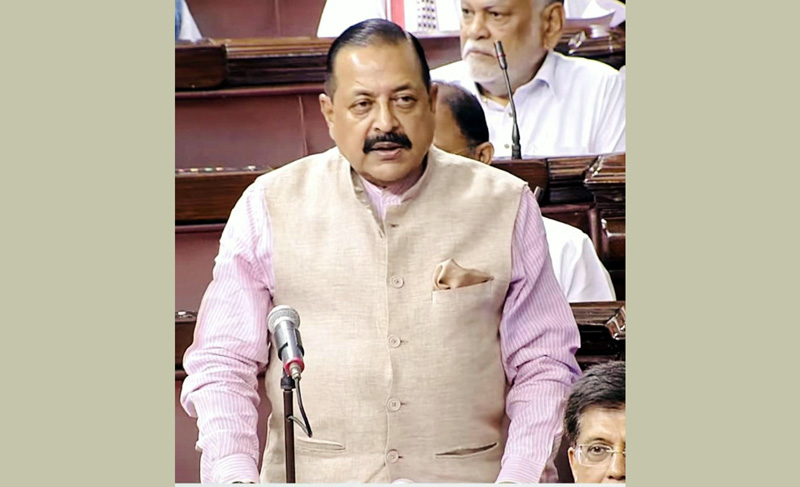Excelsior Correspondent
NEW DELHI, July 28 : Union Minister of State (Independent Charge) Science & Technology; Minister of State (Independent Charge) Earth Sciences; MoS PMO, Personnel, Public Grievances, Pensions, Atomic Energy and Space, Dr Jitendra Singh today updated Rajya Sabha about the emerging trend of StartUps in Space sector.
Pertinent to mention that ever since the Space sector was “unlocked” and opened up for private partners on the directions of Prime Minister Narendra Modi about two years back, within a short while, more and more numbers of StartUps in the country have started approaching Indian Space Research Organisation(ISRO) with their projects. Over 60 StartUps have already registered with ISRO and these include some of the latest areas of space activity like debri.
Dr Jitendra Singh said, ISRO is currently developing technologies for Human Rated Launch Vehicle, Orbital Module, Life Support System, Crew Escape System, Human Centric Products and Crew Recovery for Gaganyaan mission. All these technologies will act as building blocks for pursuing space tourism in future.
In reply to a question related to private StartUps offering satellite services to global customers, Dr Jitendra Singh informed the House that about 15 start-ups are working in the domain of offering satellite services i.e. value-added services through satellite data. The Minister said, Indian National Space Promotion and Authorization Centre [IN-SPACe] is conducting a survey to build the capability matrix of Indian StartUps, which shall serve as the definite database for private activities in the space sector.
The Minister stated that at present there are no plans to make a law specific to space tourism. However, as a part of ‘Gaganyaan’ mission, India is developing technologies and crew safety protocols required for human space flight missions.
In light of the space reforms announced by the Government in 2020, greater participation of Non-Government Entities [NGEs] is envisaged in carrying out end-to-end activities in the space sector. Under these reforms, the Government may consider Public Private Partnership (PPP) for advancement of space technology.
In reply to another question, Dr Jitendra Singh told the House that India has a target of 300 billion US Dollars in Bioeconomy by 2030.
He said, India registered a sustained growth in Bioeconomy from $44 Bn US in 2019 to 80.1 Bn in 2022.
The Indian biotech industry is aligned around five major segments: BioPharma, BioAgriculture, BioIndustrial, Bio-energy and combined segment of BioServices comprising BioIT, CROs, and Research Services.
Bioeconomy is seen as a means to address societal challenges. For example, use of biomass for renewable resources in energy production processes, use of green chemicals and materials; biofertilizers, waste reduction etc. may impact and have a cascading effect on carbon footprint, food and nutrition, health, energy independence, and environmental sustainability. New Innovative solutions are expected from the Biotech Industry, Research Institutes and growing Biotech Startup ecosystem.


